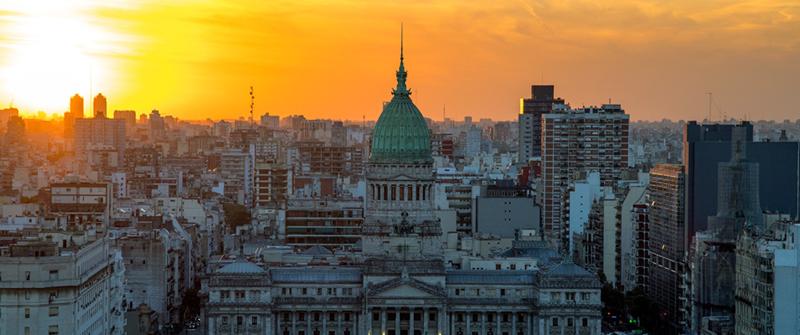
Welcome to Buenos Aires!
Buenos Aires is the capital and largest city of Argentina. The city is located on the western shore of the estuary of the Río de la Plata, on the South American continent's southeastern coast. It is the most visited city in South America, and the second-most visited city of Latin America behind Mexico City. Buenos Aires is a top tourist destination and is known for its preserved Eclectic European architecture and rich cultural life.
Below you will find important information about Buenos Aires which can help you plan your trip or may be useful to you in an emergency or at any time during your visit.
Buenos Aires Weather/Climate
Buenos Aires has a temperate climate. Argentina's high season is during the summer months of October through March and during the winter month of July. The winter months of June to August will be much cooler and require warmer clothes and less outdoor activity.
- Temperatures: Average August temperature: 12.8 ºC
- Sunshine: Average daily sunshine hours: 11 hours
- Precipitation: Average precipitation during August: 64.2mm
- Humidity: Average relative humidity: 73.2%
Buenos Aires Weather
Buenos Aires Airports
There are three main airports with scheduled flights serving the Greater Buenos Aires metropolitan area:
- Aeroparque Jorge Newbery (AEP), is located in Buenos Aires city proper, with scheduled domestic flights and some regional flights within southern South America.
- Ministro Pistarini International Airport (EZE), also known as Ezeiza Airport, is located 22 km southwest of the city in the municipality of Ezeiza and serves mostly international routes and some domestic flights.
- El Palomar Airport (EPA), is located 18km west of the city in the municipality of El Palomar and serves a limited number of scheduled domestic flights.
Getting Around Buenos Aires
Navigating Buenos Aires does not need to be a chore with plenty of transportation options to choose from. See more options.
Buenos Aires Time Zone
Argentina is 3 hours behind Coordinated Universal Time (UTC -3) all year. There are no Daylight Saving Time clock changes.
Emergency Services and Healthcare in Buenos Aires
Public health care in Buenos Aires is reasonably good and free, even if you’re a foreigner. Private-care systems are also available at a premium cost. Most private doctors and hospitals will expect payment in cash. Many medical personnel speak English.
Recommended Vaccinations
Before visiting Argentina, you should be up to date on routine vaccinations. For more specific information on vaccinations you should consider before traveling to Argentina, visit Traveler's Health Info for Argentina - CDC.
Tap Water
Tap water in Buenos Aires is generally safe to drink.
Hospitals
Highly regarded hospitals include Hospital Italiano, Hospital Alemán, and Hospital Británico.
Hospital Italiano
Pres. Tte. Gral. Juan Domingo Perón 4190
C1199 ABH, Buenos Aires, Argentina
+54 11 4959-0200
Open 24 Hours
Hospital Alemán
Av. Pueyrredón 1640
C1118 AAT, Buenos Aires, Argentina
+54 11 4827-7000
Open 24 Hours
Hospital Británico
Perdriel 74, C1280 AEB
Buenos Aires, Argentina
+54 11 4309-6400
Open 24 Hours
Emergency Numbers
- 911 – General emergencies Buenos Aires City and Province
- 101 – Police
- 100 – Fire
- 107 – Medical Emergencies
- 0800-999-5000 – Tourist Police
- 0800-999-2838 – Tourist Police (English is spoken)
- 103 – Civil Defense
- 105 – Environmental Emergency
- 106 – Emergency at sea